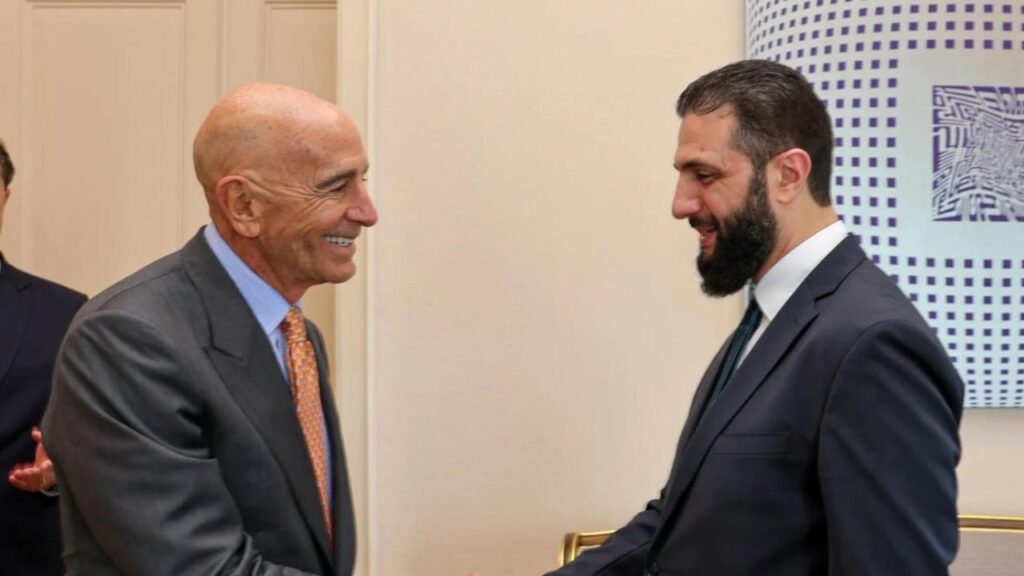The recent shift in Syria’s approach to managing foreign fighters has caught the attention of the US and the global community alike. The US Special Envoy was visibly impressed—some might say stunned—by the steps Syrian President Ahmed al-Sharaa has taken to curb extremist influences and stabilize the war-torn nation. This article breaks down what’s happening, why it matters, and what it means for the future of the region and international relations.

US Special Envoy Stunned by Syrian Leader’s New Strategy
| Aspect | Details |
|---|---|
| US Special Envoy | Thomas Barrack, also US Ambassador to Turkey, praised Syrian leader’s steps to address foreign fighters. |
| Syrian Leader | Ahmed al-Sharaa, former al-Qaeda affiliate leader, now working to distance Syria from extremist elements. |
| Policy Shift | Expulsion of Iran-backed groups, openness to Abraham Accords, and efforts toward regional stability. |
| US Sanctions Status | Trump administration eased sanctions, including six-month waiver of Caesar Act. |
| Regional Impact | Potential for improved Syria-Israel relations and reduced extremist threats. |
The US Special Envoy’s surprise and praise for Syria’s new strategy on foreign fighters is a sign that even the most entrenched conflicts can find pathways to peace with bold leadership and diplomacy. Ahmed al-Sharaa’s pivot from extremism toward cooperation and stabilization offers a glimmer of hope for Syria’s future—and a chance for the US and the international community to engage constructively.
While challenges remain, this strategic shift could reshape Middle Eastern geopolitics, foster economic opportunities, and bring relief to millions of Syrians caught in the crossfire.
Understanding the New Syrian Strategy on Foreign Fighters
The Syrian civil war has been one of the most complex and devastating conflicts in recent decades. Since 2011, Syria has been a hotspot for various extremist groups, including foreign fighters who joined the conflict with their own agendas. These groups have contributed to prolonged violence, destabilization, and a massive humanitarian crisis.
Enter Ahmed al-Sharaa, a former militant leader who has flipped the script. Once known as Abu Mohammad al-Julani and affiliated with the al-Qaeda-linked group Hayat Tahrir al-Sham (HTS), Sharaa has renounced extremism and is now steering Syria toward a new direction. His administration’s focus is clear: reduce foreign fighter influence, expel Iran-backed factions, and promote political stabilization.
This new stance has earned praise from none other than Thomas Barrack, the US Special Envoy and Ambassador to Turkey, who sees these moves as promising signs of Syria’s potential return to regional peace and normalized relations.
What Does This Mean for US-Syria Relations?
The US has long maintained sanctions against Syria, primarily due to human rights abuses and Syria’s alleged support for terrorist organizations. However, the recent easing of some sanctions—including a six-month waiver of the Caesar Syria Civilian Protection Act—marks a significant shift.
This sanction relief, alongside the Syrian government’s cooperative steps, signals a window of opportunity. It’s a chance for diplomatic engagement, improved humanitarian aid access, and possibly easing tensions with other regional players like Israel.
Breaking Down the Syrian Leader’s New Approach
1. Distancing from Extremist Groups
The Syrian government, under Sharaa’s leadership, is actively working to purge extremist factions from Syrian territory. This includes efforts to expel Iran-backed Palestinian groups who have been entrenched in Syria for years, creating a more controlled and unified government presence.
2. Openness to the Abraham Accords
One of the most eye-catching moves is Syria’s conditional openness to join the Abraham Accords—a series of normalization agreements between Israel and several Arab nations. Sharaa’s administration has expressed willingness to normalize relations with Israel if certain conditions are met, such as halting Israeli military actions in Syria and addressing disputes over the Golan Heights.
3. Fostering Regional Stability
By removing destabilizing forces and seeking diplomatic engagement, Syria is aiming for stability that could benefit the entire Middle East. The US Special Envoy highlighted these moves as “significant steps” that could pave the way for peace and economic recovery.
Practical Insights: What This Means for the International Community
For Policymakers and Analysts
- Diplomatic Opportunities: This shift opens avenues for renewed diplomatic talks and possible peace negotiations, which have been stalled for years.
- Security Improvements: Reduced foreign fighter activity means less cross-border terrorism risk, which is a win for regional and global security.
- Humanitarian Aid: Easing sanctions might allow more effective delivery of aid to Syrian civilians, mitigating the ongoing humanitarian crisis.
For Businesses and Investors
- Potential Market Opening: Political stabilization can lead to economic recovery, presenting opportunities in reconstruction and energy sectors.
- Risk Assessment: While promising, the situation remains fragile. Businesses should carefully monitor developments and compliance with international laws.
The Road Ahead: Challenges and Considerations
No one’s saying this is a done deal. Despite progress, Syria faces steep hurdles:
- Governance Reform: Integrating various ethnic and religious groups into a cohesive political framework remains challenging.
- Sanction Complexity: While some sanctions have eased, others remain in place, requiring careful navigation.
- Regional Tensions: The Middle East is a powder keg, and Syria’s relations with neighboring countries will continue to impact its path forward.
Frequently Asked Questions (FAQs)
Q1: Who is Ahmed al-Sharaa?
Ahmed al-Sharaa is Syria’s current leader who previously led the extremist group Hayat Tahrir al-Sham but has since renounced extremism and is focusing on stabilizing Syria.
Q2: What are foreign fighters?
Foreign fighters are individuals who travel from other countries to participate in armed conflicts, often associated with extremist or militant groups.
Q3: What is the Caesar Syria Civilian Protection Act?
It’s a US law imposing sanctions on the Syrian government to pressure it to end human rights abuses. Recent easing allows some sanctions relief to encourage reform.
Q4: What are the Abraham Accords?
These are agreements normalizing relations between Israel and several Arab countries, promoting peace and cooperation in the region.
Q5: Why is this new Syrian strategy important for the US?
It potentially reduces terrorism threats, opens diplomatic channels, and could stabilize a key region affecting US foreign policy.






